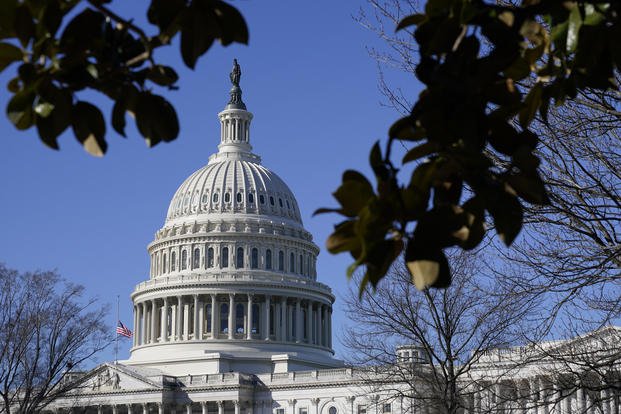Service members and Defense Department civilians making less than $45,000 annually would get a monthly "inflation bonus" in 2023 under a House proposal released Tuesday.
The proposed bonus of 2.4% was floated by Rep. Jared Golden, D-Maine, as part of a proposed amendment to the $802 billion annual defense policy bill being hammered out by Congress. The mammoth must-pass legislation -- and proposed amendments -- is scheduled to be debated by the House Armed Services Committee on Wednesday.
"The Department of Defense today must counter growing threats the world over, and those threats are only becoming more complex," Golden said in a statement. "This amendment provides the additional resources required to confront these challenges and to address rising costs due to the inflation being felt across the armed forces."
Read Next: Army Officer Overseeing Safety Gets Prison Sentence After Private's Death on Firing Range
Lawmakers in both parties have been expressing concern about troops, just like the rest of the American public, being squeezed by spiking prices on groceries, gas and other goods.
Still, committees with jurisdiction over troop pay have so far endorsed a 4.6% pay raise for service members for 2023 even as inflation is above 8%. That includes the House Armed Services Committee's current version of the National Defense Authorization Act, or NDAA, which largely follows the Biden administration's defense budget request for fiscal 2023.
Golden's amendment would not increase the basic pay raise. But it would create inflation bonuses for 2023 equal to 2.4% of a service member or Pentagon civilian's basic pay, according to the text of the amendment.
To fund the bonuses, the amendment would add $800 million to military personnel accounts and $60 million to civilian personnel accounts.
Overall, Golden's proposal would add a whopping $37 billion to the estimated price tag of the annual policy bill.
The amendment would put $3.5 billion toward military construction inflation costs and $2.5 billion into the legislation for fuel inflation costs, according to a summary from his office. It would also add $550 million to a fund for Ukraine military aid, bringing the total for 2023 to $1 billion. There are also billions more than the Biden administration requested for more aircraft, ships and other military hardware.
Republicans for months have complained that President Joe Biden's defense budget request for fiscal 2023 is inadequate in the face of record inflation and threats including the war in Ukraine. While Democrats have a slim majority in the House, centrist Democrats, such as Golden, have been expected to side with Republicans on increasing the defense budget beyond Biden's request. Last year, 14 Democrats on the House Armed Services Committee voted with Republicans to add $25 billion to the 2022 defense budget.
While House Armed Services Committee Chairman Adam Smith, D-Wash., supports Biden's request, he has acknowledged the likelihood that the final NDAA signed into law will have a higher price tag than he'd like.
"We are going to wind up with an increased number," Smith said at an event last week hosted by the Defense Writers Group.
Smith also suggested that increasing troop pay to address inflation concerns could be difficult because it opens up debate about civilian federal workers' pay.
"The general rule that we've tried to stick to is to give federal employees the same pay raise, even within the military, civilian and non-civilian," Smith said. "So are the Republicans going to want to go above 4.6 for others? How do we meet that?"
While a $37 billion plus-up for the defense budget would be significant, it would still fall short of what the Senate Armed Services Committee has approved. The Senate panel last week advanced a version of the NDAA that is $45 billion more than Biden requested.
The extra money in the Senate bill did not include going above 4.6% for the basic pay raise, with committee staffers similarly saying that could open up debate about civilian pay. But it did include some money to offer more special and incentive pay and recruiting and retention bonuses to address inflation concerns.
-- Rebecca Kheel can be reached at rebecca.kheel@military.com. Follow her on Twitter @reporterkheel.
Related: Senate Panel Adds Billions to Defense Budget But the Extra Money Wouldn't Go to Troop Pay Raises













